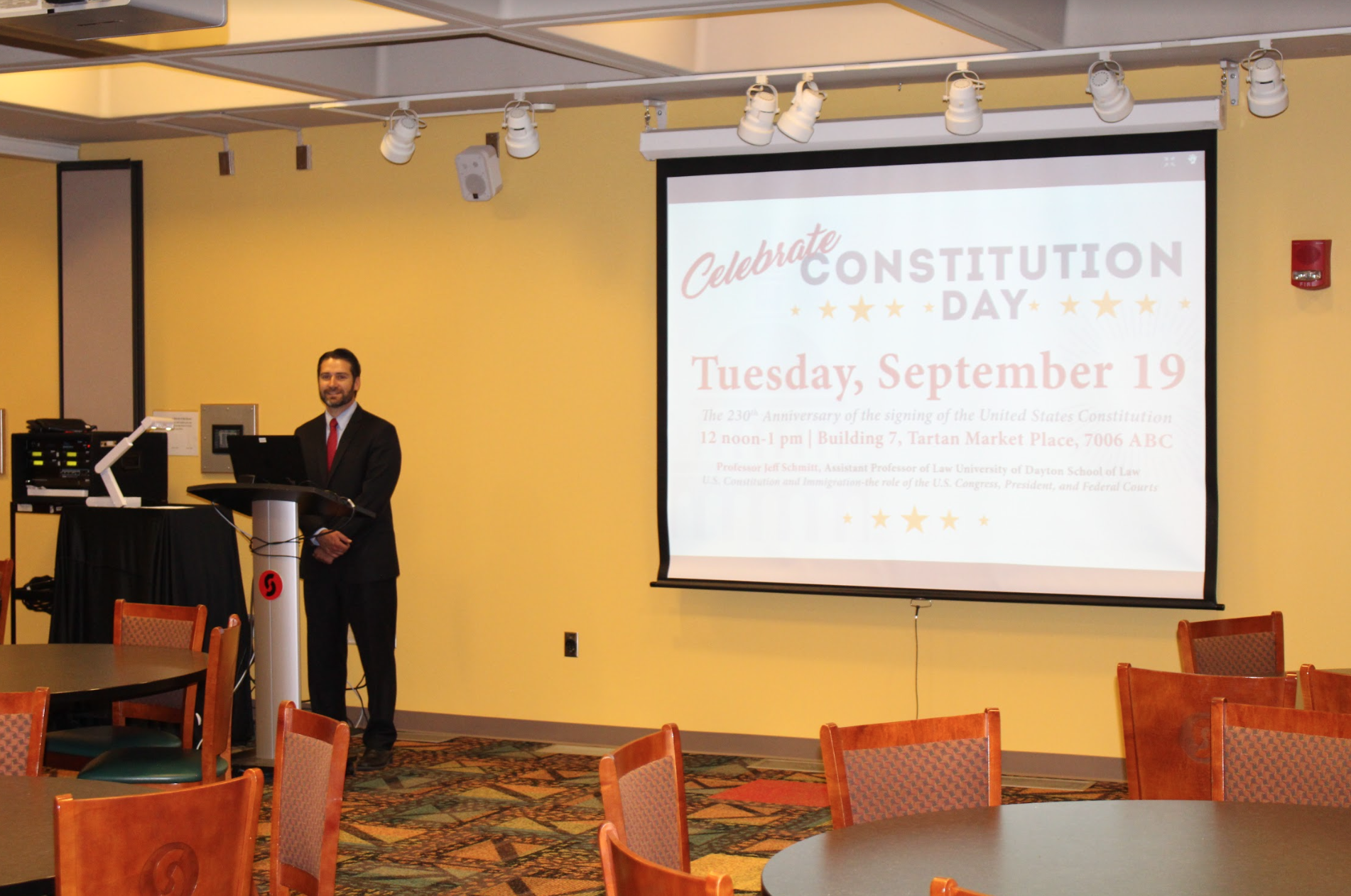Last week the department of humanities, government and modern languages held a presentation to celebrate and reflect upon the 230th anniversary of the signing of the U.S. Constitution.
Jeff Schmitt, an Associate Professor of Law at the University of Dayton, was the speaker for the event. He discussed three current event issues happening in the U.S. related to immigration and analyzed them through a constitutional lense.
Schmitt’s goal for his speech was to present these issues in “a neutral interpretation from a constitutional standpoint.”
These three subjects were Deferred Action for Childhood Arrivals, (DACA) sanctuary cities and the travel ban.
DACA was implemented by Barack Obama in 2012 and applies to immigrants who have been in the U.S. since 2007 and moved there before their 16th birthday. They are part of the program so long as they haven’t been convicted of any felonies.
The federal government will not pursue any deportation action towards those in the program. The program applies to roughly 800,000 people in the U.S.
Schmitt explained that no court has ruled the act constitutional.
He elaborated on the reasons President Donald Trump recently rescinded DACA and mentioned how it is a separation of powers issue.
The argument was made by Attorney General Jeff Sessions. He claims Congress has done nothing to authorize the implementation of DACA. He believes that since the power to enact a law is in the hands of Congress and not the president, the program is not constitutional.
The other side of the argument is that the Constitution gives the president the power to make sure the laws are faithfully executed in Article II.
The second issue Schmitt talked about was the controversy surrounding sanctuary cities.
A sanctuary city is one that chooses not to voluntarily comply with immigration enforcement, such as ignoring detainment requests from Immigration Customs Enforcement (ICE) agents.
The constitutional issue facing sanctuary cities came from Trump’s first month in office. He signed an executive order that would attempt to withhold law enforcement funds from sanctuary cities.
A common practice is for the federal government to supply states with funds, but certain conditions have to be met.
For example, the legal drinking age was changed to be 21 years old in every state because the federal government withheld highway funds unless the change was made.
However there is a limit on the terms the government can create. A constitutional issue arises from the fact that the government can be too coercive in its terms.
A recent example is how states were required to expand medicaid or they wouldn’t be given funds, and the Supreme Court ruled it as too coercive a violation of states’ rights and unconstitutional.
This will be a main argument Chicago will use in their upcoming court case vs Sessions.
Schmitt’s final topic touched on the travel ban passed by a Trump executive order on Jan. 27.
The ban suspended refugees from certain Muslim based countries, and cut overall refugees accepted to half by the end of the year.
The constitutionality of the ban is in question, however, due to the potential misuse of the plenary power Congress and the executive branch share on immigration issues.
Plenary power is a doctrine that was introduced in the 1800s that gave Congress and the executive branch the power to do whatever it wants as long as it has a legitimate and honest reason.
The 4th circuit court of the U.S. argues that while there is a legitimate reason for the ban, (the threat of terrorist attacks) it is not an honest reason due to the ban being focused on the Islamic religion.
The court believes this violates the establishment clause of the first amendment to the Constitution, as people can not be discriminated against due to their religion. It says that government action must serve a secular (non-religious) legislative purpose.
Schmitt explains that the evidence the court used to support its claim were a variety of statements and quotes from Trump about the ban.
The court states that the quotes from the executive branch show that the motive for the ban is religious and targets Muslims specifically.
Schmitt closed out his speech by saying that while smaller courts don’t approve of the ban and the Supreme Court is set to review its constitutionality, the actual reform of these issues must come from Congress.
Constitution Day is celebrated every year and colleges are required by law to hold an event commemorating it.
Professor Schmitt graduated from the University of Virginia School of Law, where he served as an essays editor on the Virginia Law Review. He received his bachelor’s degree from Miami University.
Henry Wolski
Executive Editor

